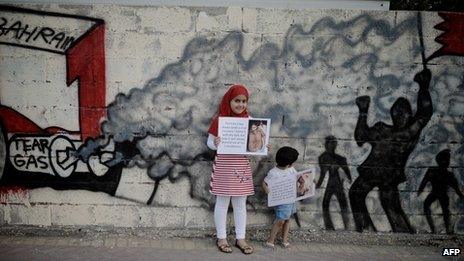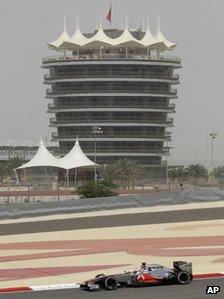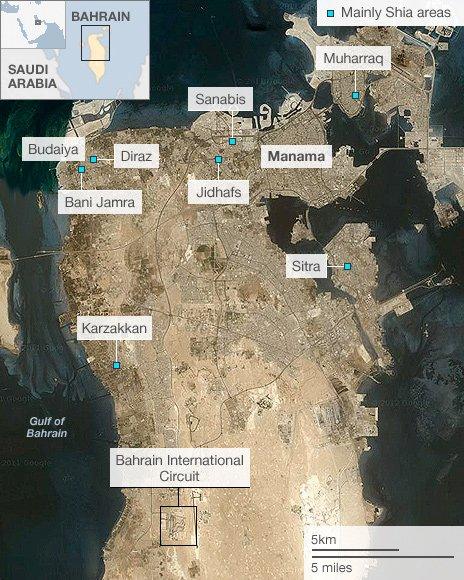Bahrain security stepped up for F1 practice runs
- Published

Anti-government protests have been widespread in the run up to the Grand Prix
Security has been tightened in Bahrain in preparation for protests, as Formula 1 cars take to the track for practice sessions ahead of Sunday's Grand Prix.
Security forces fired tear gas and stun grenades to disperse anti-government demonstrations overnight in mainly Shia villages around the capital, Manama.
Activists have promised "three days of rage" at the decision to hold the Grand Prix and the crackdown on dissent.
The crown prince has warned cancelling the race "just empowers extremists".
While admitting that Bahrain was "not perfect", Prince Salman bin Hamad Al Khalifa told journalists that the Grand Prix was a "force for good".
"I think for those of us who are trying to navigate a way out of this political problem, having the race allows us to build bridges across communities, get people working together," he said.
"I actually think that having the race has prevented extremists from doing what they think they need to do out of the world's attention."
Speaking alongside the crown prince, Formula 1 boss Bernie Ecclestone added: "If people have got a complaint about something else, it's nothing to do with F1."
Prince Salman also guaranteed the safety of the racing drivers and teams, after a car carrying members of the Force India team was caught in clashes between police and protesters, during which a petrol bomb exploded nearby.
Earlier, Force India announced that its involvement in the day's second practice session would be limited due to safety concerns.
Last year's Grand Prix was cancelled after 35 people died that February and March during unrest and a crackdown on demonstrations calling for greater democracy demanding an end to discrimination against the majority Shia Muslim community by the Sunni royal family.
Human rights groups and activists estimate that at least 25 people have died since, many as a result of what has been described as the excessive use of tear gas.
Burning tyres
Formula 1's governing body, the FIA, only decided to go ahead with this weekend's race at the last minute, after the government said it had security under control.
On the eve of Friday's practice session, which began at about 10:00 (07:00 GMT), there were fresh anti-government protests in several predominantly Shia villages.
Demonstrators called for the "overthrow of the regime" and the release of the human rights and political activist, Abdulhadi al-Khawaja, who has been on hunger strike in prison for more than 70 days in protest at the life sentence he received from a military tribunal last June.
Mr Khawaja is now said to be refusing everything except water.
Riot police fired tear gas and stun grenades at the protesters, who responded by throwing petrol bombs and stones, witnesses said.
Several roads leading to the race circuit were also briefly blocked by burning tyres.

One survey says 77% of Bahrainis are in favour of the Grand Prix going ahead
"A number of rioters and vandals had been arrested for taking part in illegal rallies and gatherings, blocking roads and endangering people's lives by attacking them with petrol bombs, iron rods and stones," the Information Affairs Authority said in a statement, citing public security chief Maj-Gen Tariq al-Hassan.
But a member of the Bahrain Youth Society of Human Rights called Mohammed told the BBC that they had thrown petrol bombs in self-defence.
"Yesterday... we demanded from the security forces let us protest in a place called Bani Jumra. And within minutes we were attacked with tear gas and 'sound bombs'," he said.
"We want to send them the message that still the revolution continues and that there are still human rights violations happening in Bahrain, and that they must respect the Bahraini people and respect their demands."
The main Shia opposition group, al-Wefaq, said 70 people had been injured by security forces in the past two days and 80 others arrested.
The authorities have authorised an opposition protest along a motorway leading to the BIC at 16:00 (14:00 GMT). Correspondents say riot police will have to show restraint with the international media so close at hand.
The 14 February Youth Movement has called for "three days of rage" to coincide with the Grand Prix, while the main Shia opposition group, al-Wefaq, has called for protests.
"The protest is having international impact because there are foreign journalists here for F1. Once they leave, the repression will continue but the world won't hear about it," activist Nabeel Rajab told the BBC.
'A lot of hype'
The government has called on Bahrainis to move forward and hopes the race will offer the opportunity to show that life is returning to normal.
It says King Hamad has accepted the findings of an independent panel of human rights experts that investigated last year's unrest, and announced constitutional reforms intended to lead to greater accountability.
"We are a sporting event, we are a social event, we have nothing to do with the political scene, and I think that's better left to sort out between the politicians and government," the chairman of the Bahrain International Circuit, Zayed al-Zayani told the BBC.
The official Bahrain News Agency also reported on Friday that 77% of the people living in the country were in favour of the Grand Prix going ahead, according to a survey conducted this week by Nielsen.
The F1 world champion and Red Bull driver, Sebastian Vettel, meanwhile insisted that concerns about security were overblown.
"It's not a big problem and I'll be happy once we start testing... because then we can worry about the stuff that really matters - tyre temperatures and cars. I don't think it's that bad. I think it's a lot of hype," he said.
